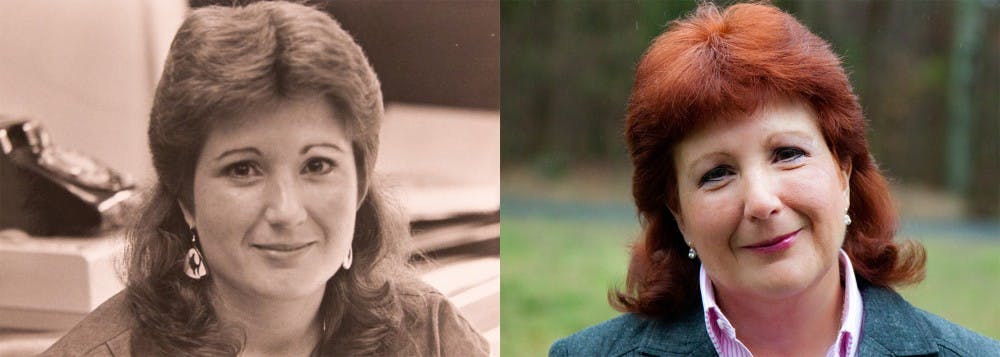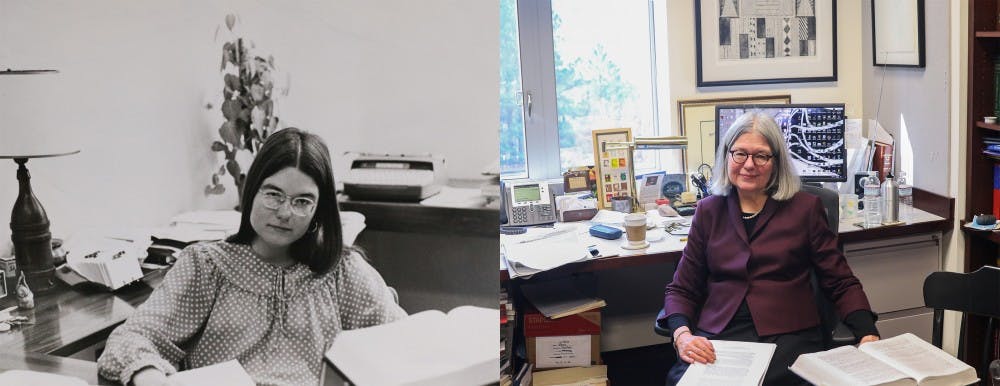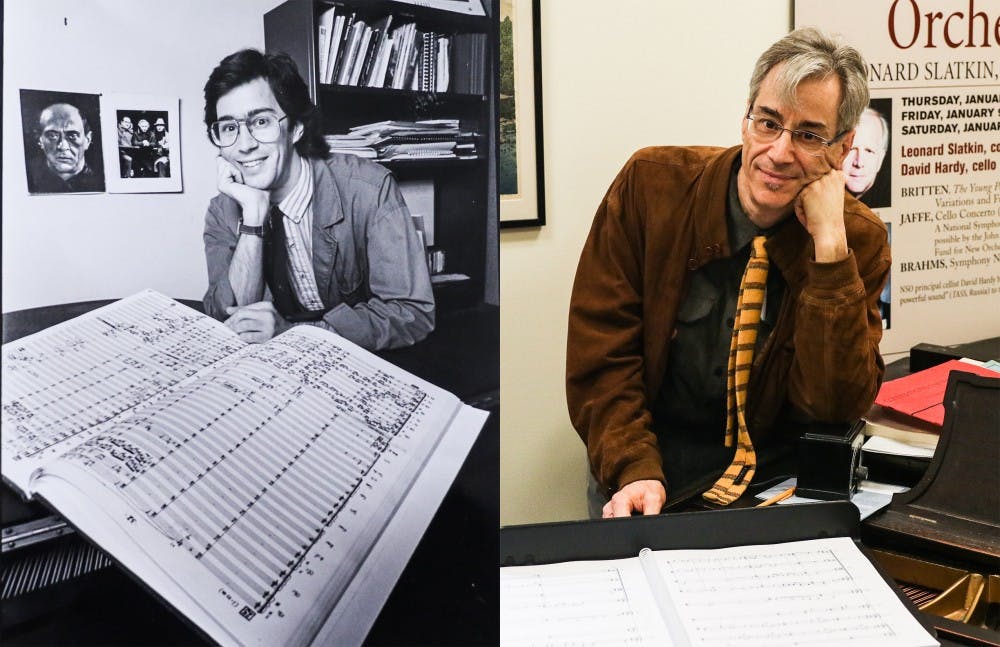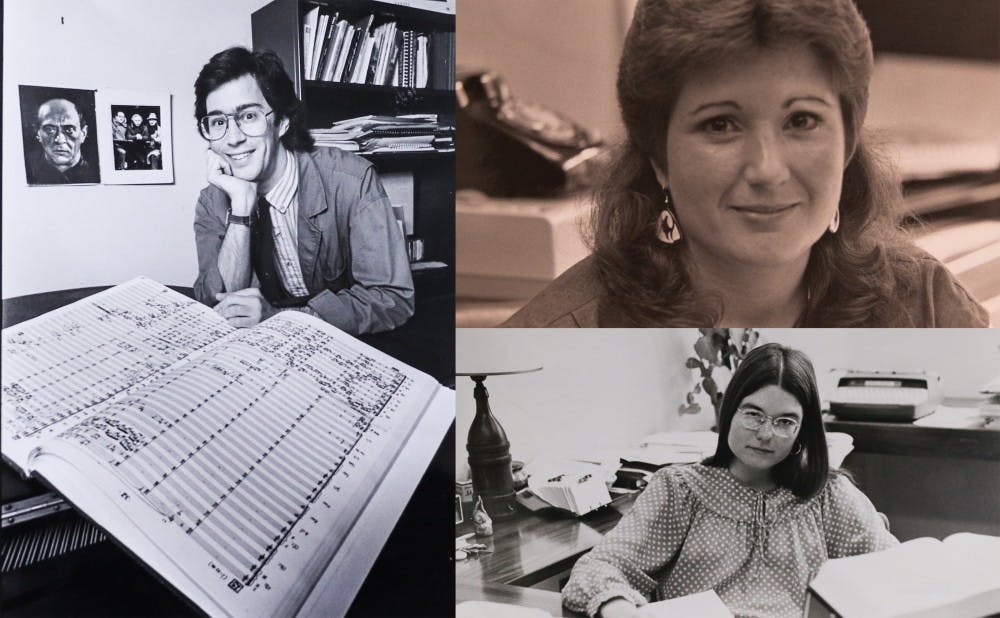For the fifth and, for now, final installment of the Dear Old Duke photo series, we look at three professors from different walks of campus—a linguist, a lawyer and a composer. Edna Andrews studies language and the brain, Deborah DeMott teaches art law and Stephen Jaffe is a composer.
The first Dear Old Duke focused on a couple of archaeologists, the second focused on four of Duke's long-serving deans, the third on a pair of biologists and the fourth on three of Duke's social scientists. The interviews have been edited for length and clarity.
Edna Andrews
Edna Andrews arrived on campus in 1984 and she hasn't left Duke since. She is the chair of the linguistics program at Duke, the Nancy and Jeffrey Marcus distinguished professor of Slavic and Eurasian studies and a professor of linguistics and cultural anthropology. She's involved with the FOCUS program, and her research now focuses on the intersection of language and neuroscience—particularly through a longitudinal fMRI study on language acquisition and multilingualism.

Edna Andrews: "So I came in 1984, right out of graduate school. I was 25, it was my first job. I had other job offers, including Yale, but I decided to stay here. So here I am."
The Chronicle: What’s changed since you first came here?
EA: "When I first came I was teaching mainly Russian-related courses, but now primarily teach neuroscience courses with a focus on brain and languages...Our neurolinguistic lab published the first, or the only, longitudinal fMRI study of second and third language acquisition. I work with DIBS—the Duke Institute for Brain Sciences—and the Center for Cognitive Neuroscience."
TC: What was the period when you kind of shifted your research focus?
EA: "So that was in the early 1990s. I started working in a neurobiology lab with a colleague in neurobiology—around 1993. It was also around that time that we started the linguistics major. Then a few years after that— 1997, 1998—that we started the Ph.D. program in linguistics, but we housed the linguistics Ph.D. through English. But the undergraduate program was self-standing."
TC: Looking at the University as a whole, what do you think has changed the most since then?
EA: "The students have always been outstanding. I think we’ve lost some flexibility as we’ve grown. So I love the degrees of freedom, of flexibility. I think we have done a great job of moving forward with multidisciplinarity. I think Duke is one of the best schools in the country, and multidisciplinary research is a hallmark of the institution and one of the things that allows faculty to really work across boundaries in a profound way. It’s not just research, it’s also teaching and friendships."
TC: What do you think is the University’s direction going forward and what are you most excited about with it?
EA: "I am the director of the FOCUS program, and FOCUS is part of the Strategic Plan. I am very excited about how that is going to play out—that we are going to have some modest growth, that we are maintaining our commitment to all major disciplinary directions—the natural and biological sciences, social sciences and humanities. And I think that small group learning and building of communities at the first year, first semester level is essential to a successful undergraduate experience."
TC: You mentioned that you came here right out of graduate school and you’re still here, so what does it mean to you to spend such a long time at Duke?
EA: "Well, it feels like home. You’re comfortable here, you build long-term relationships with colleagues and students. You’re here, and they can come back 20 years later and re-connect."
Deborah DeMott
Deborah DeMott came to Duke in 1975, and is currently the David F. Cavers professor of law in the School of Law. Her research focuses on business, agency and tort law. One of her long-standing interests is, however, visual art, which was influential in her decision to create a course on art law at Duke.

Deborah DeMott: “I joined the Law School faculty in 1975. At that point I lived in Chapel Hill and I taught a course on contracts and I taught corporate law—which here is called business associations."
The Chronicle: For you, what are some things that have changed since then?
DD: "Many things have changed since then. First of all, just for starters, the Law School building has changed dramatically since then…What I teach now is completely different. It strikes me that many distinguished, long term academics in the humanities, like the Meyerses, tend to continue teaching and doing scholarship and writing about not the same thing, but closely linked inquiries. Changes in many things at Duke and the Law School, including the expansion of the faculty, have meant that I no longer teach the business courses. So there was a period when I was also teaching corporate finance; I no longer teach that. I teach what is typically a large-enrollment class on tort law in the first year. So wonderfully once again I am teaching first-year students, which is great. In the interim in my career, I worked on a long study and book on the law of agency—when one person has legal power to represent another…
Then, the other big thing that happened for me in regards to my teaching and writing, I actually date, at Duke, to the opening of the Nasher Museum. I’ve had a lifetime interest in the visual arts in many dimensions and the world of art, then when I became a lawyer in how transactions take place. Lots of transactions that involve significant works of art are through agents, like dealers or auction houses… I have long found that looking at art and thinking about works of visual art really enriched my life.
Then with the opening of the Nasher Museum, I was open to persuasion by the founding director of the Nasher that the Law School should have a course in art law…and then that I should teach it. It really didn’t take that much persuasion… That’s been… gratifying and satisfying. It’s been wonderful to watch the museum find itself and define itself as a museum that matters."
Stephen Jaffe
Stephen Jaffe is the Mary D.B.T. and James H. Semans professor of music composition, and he has been at Duke since 1981. He was elected to the American Academy of Arts and Letters in 2012 and has received the Kennedy Center's Friedhiem Award.

The Chronicle: What’s going on in your life now? Are you teaching classes?
Stephen Jaffe: "Oh yeah, I’m very involved in teaching. One of the things that I’ve been a part of at Duke is building a graduate program in composition. That’s one of the things I was brought here with the hope of shaping such an initiative, and now we have an absolutely fabulous program with students from all around the world. It’s an absolutely thriving place. We partner with Duke Performances, with the North Carolina Symphony and with our colleagues in the department. Our students are doing the most exciting things, it’s kind of a dream. We’re now going through applicants for next year, and they are also quite diverse musically, by culture and background. They have musical interests that could not even have occurred to me in the 1980’s, in part because they weren’t born yet and the technology has changed so much. It’s very exciting…
I’m continuing to write. I’m working on a collaborative project with four composers now, and the writer Richard Powers, called “A Forest Unfolding.” It’s all about people’s relationships with forests—historically, scientifically…
I’m also writing a symphony for orchestral winds, which is very exciting. I still have the same desire and passion to do it that I did 30 years ago. I’m still up all night, because that’s a great time to work. It’s when it’s very quiet, no distractions. Just write. So that’s really fun."
Get The Chronicle straight to your inbox
Signup for our weekly newsletter. Cancel at any time.
Bre is a senior political science major from South Carolina, and she is the current video editor, special projects editor and recruitment chair for The Chronicle. She is also an associate photography editor and an investigations editor. Previously, she was the editor-in-chief and local and national news department head.
Twitter: @brebradham
Email: breanna.bradham@duke.edu

